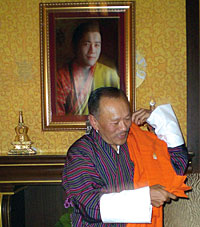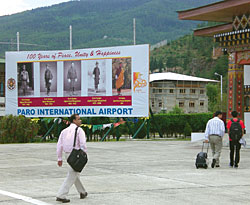 PICS: KUNDA DIXIT ROYAL TRIBUTE: Prime Minister Jigmi Thinley greet visitors in Thimphu last week. |
Bhutan expects to double its GDP in five years. And it doesn't even believe in GDP, but in Gross National Happiness (GNH), the national policy that combines cultural and environmental preservation with a welfare state and guided democracy.
"We don't want to make Nepal's mistakes" is a phrase you hear often in Bhutan. It's not helpful to compare because Nepal is 40 times bigger than Bhutan's 700,000 population. Yet, officials here keep reminding you, this country doesn't want to lose its monarchy and have a feckless democracy.
When former king Jigme Singye Wangchuk proposed GNH as a national doctrine in the 1990s, many made fun of the idea. Then, in 2006, he announced dramatic democratic reforms and stepped down to make his 26-year-old son Jigme Khesar the king.
Jigme Singye wanted to give his people democracy before they demanded it, and help preserve the 100-year-old dynasty by turning kings into constitutional monarchs with mandatory retirement at age 65. Officials say it was all done to ensure a calibrated democratic transition that would not destablise the society.
The king's move appears to be driven by a deep-seated sense of national vulnerability, and a fierce determination to preserve the Drukpa culture and counter an over-dependence on India. While Nepali politicians make public denouncements of "Indian expansionism" and try to play China off against India, Bhutan uses deft diplomacy to keep New Delhi happy and at arm's length.
Before he handed over the throne to his son, King Jigme Singye renegotiated the 1949 treaty of friendship with India and quietly removed clauses about Bhutan's defence and foreign policy being guided by India. He had been working on this for years, cultivating a personal friendship first with Rajiv Gandhi and then his widow Sonia. The king himself led his army to flush out Assamese ULFA militants from camps in eastern Bhutan, thus ingratiating himself further to New Delhi.
While Nepal just talks about it, Bhutan is set to export an additional 11,000 megawatts of hydropower to India by 2020. The idea seems to be to make energy-hungry India economically dependent on Bhutan, and not the other way around.
 A billboard with portraits of past and present kings at Paro airport . |
Not all Bhutanis are comfortable with the democracy their monarch has bequeathed to them. People see democratic decay in the neighbourhood and are afraid Bhutan may also follow. Among politicians and the bureaucracy there are misgivings about an over-zealous parliamentary opposition and a newly-aggressive media.
Prime Minister Jigmi Y Thinley served as prime minister under the absolute monarchy and is now the elected head of government under the constitutional monarchy. Thinley admits to being "nervous" about making the democracy perform.
He says there are no plans to establish diplomatic relations with China, hinting that this will only happen when there is a green light from New Delhi. "Bhutan's choice of neighbours is determined by geography, we happen to be on the southern slopes of the Himalaya and we have relations with India of which we are happy," he said.
In a refreshing departure from Nepali politicians, Thinley makes delivery a priority. During the campaign his party promised to build roads to all 205 local administrative units, provide electricity and safe drinking water to every home, ensure every primary school is only one hour walk away and staff every district hospital with three doctors and two ambulances.
"We made huge promises to the people at election time, and it will be a big challenge to meet them," Thinley admits.
Bhutan's eviction of 100,000 Lhotsampas in 1991 was a deliberate policy to prevent what the Drukpa felt was Nepali speakers over-running the country. By pushing democracy now, Bhutan could also be legitimising the eviction of its people. Now that the refugees are being resettled in third countries, officials here appear confident that the problem will now "go away", despite the activities of Bhutani Maoists.
Although refugee leaders say many Lhotsampas are still denied citizenship papers and were not allowed to vote in the last election, Nepali-speakers make up one-fifth of the MPs and cabinet posts in the new government.
The fertile southern valleys where the Lhotsampa lived are about to be submerged in reservoirs to generate power for India. Bhutan may be a happy country, but it has come at a cost: the mass misery of one-sixth of its population that it evicted 20 years ago.


